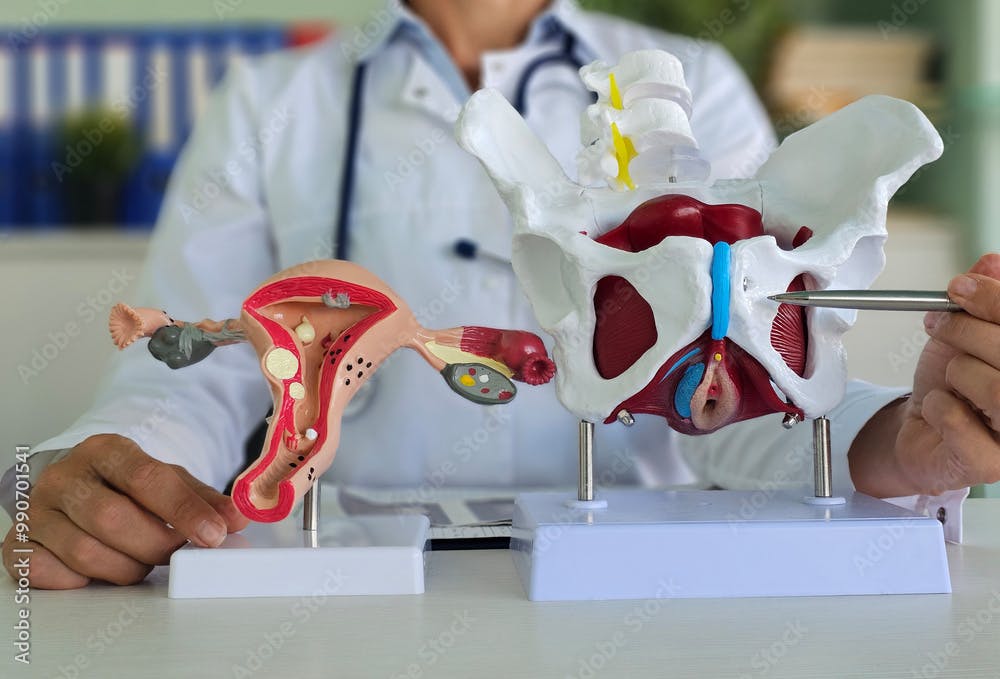Urogynecology and Reconstructive Pelvic Surgery

Specialized Care for Women's Pelvic Health
When pelvic floor disorders go untreated, they can interfere with everything from daily routines to close relationships. Symptoms like bladder leakage, pelvic pressure, or recurring discomfort affect your overall well-being and how you feel in your body.
Many women suffer in silence, assuming these symptoms are simply part of aging or an unavoidable consequence of childbirth. You don't have to accept this as your new normal. These conditions are highly treatable with the right care.
CLS Health’s board-certified urogynecologist is an expert in the evaluation, diagnosis, and treatment of all pelvic health conditions.
With personalized treatments ranging from non-surgical approaches to surgical procedures, we are committed to helping you restore comfort, control, and quality of life.
What is a urogynecologist, and when should I see one?
A urogynecologist is a specialist in conditions affecting the muscles and connective tissue of the female pelvic organs.
Consider seeing one if you’re experiencing:
- Leaking urine or stool, even in small amount
- Frequent or urgent trips to the bathroom
- Difficulty reaching the bathroom in time
- A feeling of heaviness or pressure in your pelvis or vagina
- A sensation that something is bulging or slipping out of the vaginal area
Our Urogynecology Services
Pelvic floor disorders are more common than many people realize. According to the American Urogynecologic Society, one in three women will experience one during her lifetime. The good news is that nearly all pelvic floor problems can be corrected through behavioral physical therapy, surgery, or medication.
Many patients find lasting relief through minimally invasive outpatient procedures which means less discomfort, less scarring, and faster recovery times.
At CLS Health’s Urogynecology and Reconstructive Pelvic Surgery (URPS) Clinic, we offer the most effective treatments — both surgical and non-surgical — delivered with compassion and personalized to each patient’s needs.
Conditions Treated
Drooping or bulging of pelvic organs into the vaginal canal due to weakened pelvic floor muscles. Common symptoms are vaginal pressure, discomfort, urinary leakage, and difficulty with bowel movements. Includes:
- Cystocele (bladder prolapse)
- Rectocele (rectal prolapse)
- Uterine prolapse
- Stress Urinary Incontinence (SUI): Leakage caused by coughing, sneezing, or physical activity
- Urge Urinary Incontinence (Overactive Bladder - OAB): Sudden, strong urges to urinate with possible leakage
- Mixed Urinary Incontinence: Combination of stress and urge incontinence
Frequent and strong urges to urinate, often resulting in incontinence, can disrupt daily activities and sleep patterns.
Frequent urinary tract infections, characterized by burning, urgency, and discomfort, may signal underlying pelvic floor dysfunction or incomplete bladder emptying.
Chronic bladder pain, pressure, and frequent urination, often misdiagnosed as recurrent urinary tract infections, can significantly impact your well-being.
Conditions requiring specialized urogynecological expertise may include complex issues such as chronic pelvic pain, scar tissue formation, and complications arising from prior surgical procedures.
Noncancerous growths in the uterus, such as fibroids, can cause heavy menstrual bleeding, pelvic pain, and pressure symptoms, and may lead to urinary and bowel issues.
Weakened vaginal muscles, often occurring after childbirth or due to aging, can lead to reduced sensation, discomfort, and functional issues.
Pelvic floor dysfunction encompasses a range of conditions related to pelvic muscle weakness or dysfunction, which can contribute to prolapse, incontinence, and pain.
Diagnostic Testing
A minimally invasive procedure called cystoscopy, which uses a small camera to examine the bladder and urethra, helps diagnose conditions such as interstitial cystitis, recurrent urinary tract infections, and structural abnormalities.
Includes urinalysis, urine culture, and specialized tests for bladder infections, inflammation, and abnormal cells.
Urodynamic testing evaluates how effectively the bladder and urethra store and release urine, aiding in the diagnosis of urinary incontinence, overactive bladder, and voiding dysfunction.
A pessary is a non-surgical treatment option for pelvic organ prolapse and stress urinary incontinence, custom-fitted to provide support and relieve symptoms.
Treatments & Procedures
- Cystocele Repair (Bladder Prolapse Repair) – Strengthens vaginal wall support for the bladder
- Rectocele Repair (Rectal Prolapse Repair) – Reinforces the vaginal wall to correct rectal bulging
- Enterocele Repair – Addresses small bowel prolapse into the vaginal area
- Vaginal Vault Suspension – Supports the vaginal apex after hysterectomy
- Sacrocolpopexy – A mesh-based procedure to correct vaginal prolapse
- Vaginal Hysterectomy – Uterus removal through the vaginal canal
- Robotic Hysterectomy – A minimally invasive, robotic-assisted alternative for complex cases
- Complex Gynecological Surgery – Tailored approaches for fibroids, endometriosis, and pelvic pain
- Incontinence Slings (Midurethral Slings) – A minimally invasive procedure for stress urinary incontinence
- Urethral Bulking Agents – Injectable treatments to improve urinary control
- Perineorrhaphy (Perineal Repair) – Restores vaginal and perineal muscle tone after childbirth or trauma
- Vaginal Rejuvenation Surgery – Improves vaginal laxity and enhances sensation
- Overactive Bladder Medications – Oral and topical treatments for symptom relief
- Bladder Botox Injections – Helps reduce urgency and incontinence by relaxing the bladder muscle
- Sacral Neuromodulation (InterStim Therapy) – A pacemaker-like device that improves bladder control
- Posterior Tibial Nerve Stimulation (PTNS) – A non-invasive therapy stimulating nerves that control bladder function
- Vaginal Fistula Repair – Surgical correction of abnormal openings between the bladder, vagina, or rectum
- Anal Sphincteroplasty – Restores sphincter function for fecal incontinence
Removal or revision of previously placed vaginal mesh due to complications or discomfort
Don't see your insurance listed? We may still accept it! CLS Health updates accepted insurance plans regularly. Please call (281) 724-1860 to verify your coverage.
- Aetna Select
- Open Access Selects
- Elect Choice
- Aetna Open Access Elect Choice
- Aetna Choice POS II
- Managed Choice
- Open Choice PPO
- Aetna Medicare Advantage Plans
CLS Health does not accept:
- Aetna CVS Marketplace Plans
* Some providers may not accept this insurance, please call to confirm
- Superior Ambetter Core (Complete, Clear, Focused, Standard Silver and Gold)
- Superior Ambetter Value (Clear Value Silver, Focused Value Silver, CMS Standard Silver & Gold Value, Everyday Value Gold)
- Superior Ambetter Virtual (Ambetter Virtual Access Silver, CMS Standard Virtual Access Basic Silver, Ambetter Virtual Access Gold)
- Superior Health Plan CHIP*
- Superior Health Plan MAPD (Medicare Advantage Prescription Drug)
- Superior Health Plan Medicare
- Superior Health Plan MMP Medicaid*
- Superior Health Plan MMP Medicare
- Superior Health Plan STAR*
- Superior Health Plan STAR Kids*
- Superior Health Plan STAR+PLUS*
CLS Health participates in most Blue Cross Blue Shield plans including:
- Blue Choice PPO
- Blue Essentials
- Blue Essentials Access
- HealthSelect
- HealthSelect of Texas In Area
- Consumer Directed HealthSelect in Area
- HealthSelect of Texas Out of State
- Consumer Directed Health Select Out of State
- HealthSelect Secondary 65+
- Medicare Advantage HMO
- Medicare Advantage PPO
- Medicare Advantage Value HMO
- POS
- Traditional/Par Plan
- TRS-Active Care
- TRS-Care Standard
- BCBS MyBlue Health (Marketplace)
*Some providers may not accept Community Health Choice, please call to confirm
- MarketplacePremier
- Medicaid*CHIPCHIP PerinateSTAR
- Medicare AdvantageDual-Special Needs Plan (D-SNP)
CLS Health accepts most Cigna plans, including:
- Cigna HMO
- Cigna Local Plus
- Cigna Open Access Plus
- Cigna PPO
- ChoiceCare PPO
- EPO
- HMO
- HMO Premier
- Medicare Advantage Plans
- HumanaChoice - Medicare Advantage PPO plan
- Humana Gold Choice - Medicare Advantage Private Fee-for-Service (PFFS) plan
- Human Gold Plus - Medicare Advantage HMO & Special Needs Plan
- Military (TRICARE South Region Military Health Plan)
- POS - including Choice POS, National POS Open Access/Plus and Preferred POS Open Access.
- PPO
*Some providers may not accept United Healthcare, please call to confirm
- Commercial, HMO, POS, EPO and PPO Plans (Charter, Choice,Core, Doctors Plan, Freedon, Heritage, Navigate, Nexus ACO, Options PPO, Passport Connect, Select)
- Indemnity
- Medicare Advantage (AARP, Care Improvement Plus, C-SNP, D-SNP, I-SNP, Erickson Advantage, ERS Medicare Advantage, TRS-Care Medicare Advantage, UnitedHealthcare Chronic Complete, UnitedHealthcare Connected (Medicare-Medicaid Plan), UnitedHealthcare Dual Complete, UnitedHealthcare Group Medicare Advantage PPO, United Healthcare Medicare Complete)
- Community Plans* (CHIP, CHIP Perinate, Star, Star Kids, Star Plus, MMP)
- Wellmed (Wellmed Dual SNP Focus, Wellmed Medicare Advantage Focus)
*Some providers may not accept Wellpoint, please call to confirm
- Medicaid (All Texas Plans Including the Below)*
- CHIP
- CHIP Perinate
- STAR
- STAR+PLUS
- STAR Kids
- Medicare Advantage
- C-SNP
- D-SNP
- I-SNP
- Medicare Advantage HMO
- Medicare-Medicaid (MMP)
- Medicare-Medicaid Program (MMP)
- STAR+PLUS MMP
*Some providers may not accept insurance, please call to confirm
PPO Networks
- Beechstreet PPO
- Carnival Cruise Lines PPO
- Envolve Benefit Options Vision-PPO, HMO
- First Health
- Curative/First Health
- Galaxy Health Network
- HealthSmart Preferred Care
- Accel
- Healthsmart Payors Organization
- Multiplan PPO
- Tricare (Humana) PPO/Prime
Employer-Specific Plans
- Brazoria County Employees – Aetna TPA Brazoria County Employees
Workers’ Compensation Plans
- Workers’ Comp
- Auto & Workers’ Comp
Medicare and Medicare Advantage
- Medicare Traditional
- Medicare Advantage
- Memorial Hermann Health Solutions Commercial and Medicare
- Molina Medicare Complete Care HMO SNP
- Medicare-Medicaid Program (MMP)
- STAR+PLUS MMP
- Alignment Health Plan
- AllyAlign Health
- American Health Plans
- Florida Complete Care
- Gold Kidney Health Plan
- Imperial Health
- Independent Health
- Kaiser Foundation Health Plan of Washington
- Kaiser Foundation Health Plan of Colorado
- Mass Advantage
- Presbyterian Health Plan
- PriorityHealth
- Provider Partners
- SCAN
- UCare
- Vantage Health Plan
- Verda Healthcare
- Zing Health
Medicaid and CHIP Programs
- Molina Healthcare* (Marketplace, Medicaid, CHIP, CHIP Perinate, STAR, STAR Kids, STAR+PLUS)
- Texas Children's Health Plans*
- TMHP (Traditional Medicaid) Traditional Medicaid
Specialty Plans
- VA Community Cares Network CCN
FAQs
Pelvic organ prolapse is the dropping of the pelvic organs caused by the loss of support of the vagina. POP occurs when there is weakness or damage to the normal support of the pelvic floor. The pelvic floor holds up the pelvic organs, including the vagina, cervix, uterus, bladder, urethra, intestines, and rectum.
If the muscles of the pelvic floor and layers of connective tissue (called fascia) become weakened, stretched, or torn, the pelvic organs may fall downward. The organs drop down from where they should be and can cause issues. In severe cases of prolapse, women may feel or see tissue coming out of the opening of their vagina. Typically, the tissue coming out is from a prolapsing cervix and uterus, or the walls of the vagina.
Risk factors for pelvic organ prolapse (POP) include childbirth and pregnancy, as vaginal delivery—especially with forceps or vacuum assistance—can weaken pelvic floor muscles. Genetics also play a role, with inherited weaker connective tissues increasing the risk, particularly among Caucasian women.
Lifestyle and injury factors such as smoking, pelvic trauma from childbirth or surgery, and hysterectomy may contribute to prolapse. Additionally, other health conditions like chronic constipation, persistent coughing, obesity, menopause, neuromuscular disorders, and heavy lifting can strain the pelvic floor.
Talk to your doctor about ways to prevent or manage POP.
A urogynecologist diagnoses POP through a pelvic exam, symptom review, and tests like urodynamics or cystoscopy to assess bladder function and organ support. Treatment ranges from non-surgical options like pelvic floor exercises and pessary devices to surgical procedures such as vaginal or robotic assisted prolapse repair.
A pessary is a removable medical device inserted into the vagina to provide support and relieve prolapse symptoms.
Procedures include vaginal or robotic hysterectomy, sacrocolpopexy, vaginal vault suspension, and pelvic floor reconstruction.
Urinary incontinence is treated through lifestyle changes, pelvic floor exercises, medications, medical devices, minimally invasive procedures, or surgery—depending on the type and severity of the condition.
Interstitial cystitis (IC) is a chronic bladder condition causing pelvic pain, frequent urination, and urgency without infection. Treatment includes dietary changes, bladder retraining, medications, and bladder instillations.
While not all cases are preventable, maintaining a healthy weight, avoiding chronic straining, quitting smoking, and performing pelvic floor exercises (Kegels) can reduce risk.

